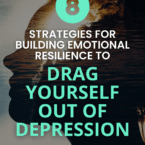
Depression is a beast of a burden, and when you’re in its grasp, it can feel as though you’re stuck in a dark abyss. But you’re stronger than you think. With the right strategies, you can cultivate emotional resilience to stand firm against depression’s assault. Here are eight ways to help you drag yourself out of the depressive depths and into a more hopeful light.
1. Embrace Self-Compassion
When you’re depressed, you might beat yourself up with negative self-talk, but that just serves to deepen the darkness. Embrace self-compassion instead. Recognize that you’re human and you’re hurting, and that it’s okay to give yourself some grace. Be patient with your progress and kind to yourself along the journey.
2. Develop a Strong Support Network
Having people who understand and support you is a powerful tool for emotional resilience. Reach out to friends and family, join support groups, or connect with online communities. You’re not alone, and sharing your journey can lighten the load.
3. Prioritize Physical Health
Your physical health significantly impacts your emotional resilience. Prioritize regular exercise, a balanced diet, and adequate sleep. These practices not only boost your physical strength but also help regulate your mood and combat depressive symptoms.
4. Practice Mindfulness and Meditation
Mindfulness and meditation can train your mind to focus on the present, reducing rumination on negative thoughts. Techniques like deep breathing, progressive muscle relaxation, or guided meditations can create a calming mental space, enhancing your resilience against depression.
5. Seek Professional Help
Professional help is crucial in your fight against depression. Therapists and counselors can provide tools and techniques to manage depression, and psychiatrists can assess if medication might be beneficial. There’s no shame in seeking help; it’s a brave step toward resilience.
6. Engage in Joyful Activities
Doing things you love can offer a mental respite from depression. Whether it’s painting, reading, gardening, or playing an instrument, these activities can raise your spirits, serving as a beacon of hope in darker moments.
7. Challenge Negative Thinking Patterns
Depression often involves persistent negative thinking. Learning to identify and challenge these thoughts through strategies like cognitive-behavioral therapy (CBT) can help reshape your mental narrative, increasing your resilience.
More: 7 Cognitive Tools for Reframing Negative Thoughts and Pulling Yourself Out >>
8. Foster a Growth Mindset
Believe in your ability to grow and adapt. Recognize that every challenge is an opportunity for personal growth. This mindset can motivate you to face and overcome the adversities posed by depression.
Remember, building emotional resilience isn’t an overnight process—it’s a journey. But every step you take on this journey is a victory, a sign of your resilience and strength.
And never forget that you don’t have to walk this path alone. If your depressive symptoms persist or worsen, reach out to mental health professionals who can provide the help you need.
As you build your emotional resilience, remember that every stumble, every setback, and every challenge is shaping you into a stronger, more resilient individual. You are capable of dragging yourself out of depression’s depths, one step at a time. Keep going, keep growing, and most importantly, keep believing in yourself. Because you’ve got this.
Read Next: 7 Lessons from Positive Psychology to Dig Yourself Out of Depression >>
















